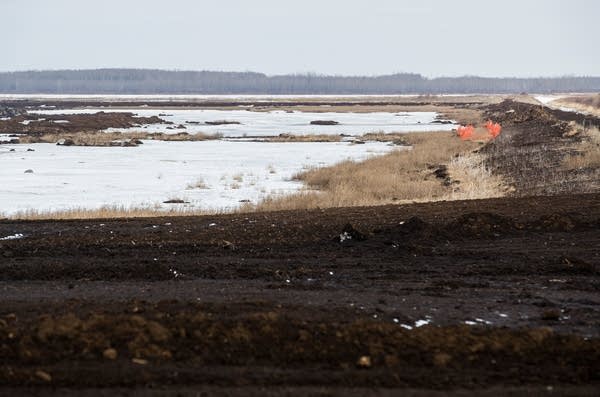Minnesota firm tries an ancient solution to heavy metal pollution

Go Deeper.
Create an account or log in to save stories.
Like this?
Thanks for liking this story! We have added it to a list of your favorite stories.
Cleaning polluted water can be difficult and expensive. But a northern Minnesota company says it's developed a natural, cheap technology to reduce one type of toxic pollution — heavy metal contamination.
The product is totally low-tech. It's made from peat. And Minnesota has lots of that.
In Aitkin, north of Lake Mille Lacs, American Peat Technology harvests and processes massive amounts of waterlogged peat from the bed of a long-gone lake. The reed-sedge peat is plant material that has been decomposing for thousands of years.
There's a massive 15-foot high pile of the brown soggy stuff outside the plant, awaiting processing.
Turn Up Your Support
MPR News helps you turn down the noise and build shared understanding. Turn up your support for this public resource and keep trusted journalism accessible to all.

"We're hauling glacial Lake Aitkin up to the plant and processing it," CEO Doug Green said as bulldozers worked the mound. "This is 82 percent water, only 18 percent fiber."
There's a lot of peat to work with. "There's probably 250,000 yards in this pile. It would last us maybe two years," Green said
American Peat's main product is a processed granulized peat. It's applied to plants and helps them draw nitrogen from the air, reducing the need for fertilizer.
But Green believes the company's future lies in protecting water from pollution. Reed-sedge peat has a natural ability to extract metals from water. Metals can flow into water from a variety of sources, including industrial and agricultural.

A lot of companies are already required to monitor and control metals in stormwater run-off. Green predicts demand for effective water treatments will grow. "Metals are going to be more and more of an issue," he said.
He's permitted to harvest the peat and says he's on top of discharges, reclamation and other environmental matters.
"We're concerned about water quality," Green said. "We're always sampling for mercury. We're meeting our limits on mercury, one of the few peat bogs that's doing that."

Environmental authorities, such as the Minnesota Pollution Control Agency, are on the lookout for high levels of metals in water.
"They're toxic," said Shannon Lotthammer, assistant commissioner for water policy at the Minnesota Pollution Control Agency.
"If they're at too high a level, they can cause harm to the aquatic life in the water," she said. "If the water is a drinking water source and it's not being treated, that can also be toxic to humans at higher levels."
Statewide surveys have found relatively low levels of metals in water in Minnesota, except for mercury. But operations such as auto recycling yards and manufacturing plants must monitor water run-off and for metals and other contaminants and take corrective action if they exceed limits.
The PCA is also looking for sulfates in lakes and streams. Sulfates are a problem for wild rice and there's major controversy in Minnesota about appropriate regulation.

American Peat is also working on a proprietary method that uses peat to capture sulfates in water. Green, the CEO, says the product is reusable.
"You can load it with sulfate and then strip the sulfate off. Load it again. Strip it. Load it. Strip it," he said.
The University of Minnesota Duluth helped American Peat refine its pollution-fighting products.

"We were able to develop the technology to make it more effective, more efficient," said Igor Kolomitsyn, a chemist at the university's Natural Resources Research Institute.
American Peat paid the NRRI to conduct peat research and refine patent applications. The university and Kolomitsyn would get a share of the revenue from any patented product.
At this point, American Peat has about a half-dozen customers for its water-treating peat, which sells for about 60 cents a pound.
Among them is Urban Accessories, a foundry in Tacoma, Wash.
The company was in quite a bind because it was responsible for polluted run-off from copper waste buried in a hillside.

"We were getting really close to getting shut down on environmental discharge," said Dan Jones, the company's safety and environmental compliance manager.
Jones says it didn't look cheap to reduce the copper in run-off flowing through a drain trough — $100,000 for a system of retaining tanks, pumps and a filtration system. But Jones tried a do-it-yourself fix first. He got some peat and women's tights.
"We made sausages full of this out of the legs of the tights. And we put these sausages filled with this product in there," he said
And the sausages captured the copper in the runoff. The cost? About $400 a year for peat, plus the women's tights.

"We buy those in bulk now," laughed Jones. "We're like the poster child now of storm water discharge in Washington state.
American Peat hopes Jones is a harbinger of soaring demand for pollution-fighting peat. The company is spending millions on research and development in a bet that peat will become a game changer.


